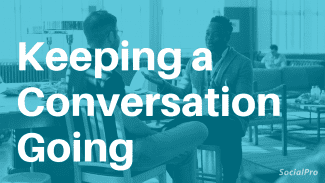“Sometimes it feels like I can’t shut up. Whenever I talk to someone, and there is a moment of silence, I feel like I have to fill it. And once I start, I can’t stop talking! I don’t want to come across as an annoying know-it-all or blabbermouth, but I don’t know how to stop doing it. Help!”
One of the main barriers we may find on our journey to making friends is talking too much. When one person dominates a conversation, the other person usually ends up feeling exhausted or upset. They assume that the person who can’t stop talking doesn’t care about them. Otherwise, they would listen, right?
One study found that people feel more understood by active listening responses than by simple acknowledgments or advice-giving.[1] Feeling understood may be even more important than feeling loved.[2]
If you want to learn how to make people feel heard and understood, the first step is understanding the reasons why you may be talking too much. Then, you can take the appropriate steps and actions.
Why do some people talk too much?
People can talk too much for two conflicting reasons: thinking they are more important than the other person or feeling nervous and anxious. Hyperactivity is another reason someone may be talking too much.
Do I talk too much?
If you find yourself walking away from conversations feeling like you haven’t learned anything about the other person, you may be talking too much. Other signs of excessive talking include your conversation partners trying to end the conversation or looking uncomfortable or annoyed. Here is a list of common signs you talk too much.
Sections
Reasons why you may be talking too much
ADHD or hyperactivity
Excessive talking and interrupting conversations can be signs of ADHD in adults. The hyperactivity and restlessness can manifest in over-talking, especially at work or in other situations where there is no physical outlet for excess energy.
This link between hyperactivity, excessive talking, and social problems starts young. One study compared 99 children with and without ADHD. Of the children they followed, those with cognitive inattention were more prone to excessive talking, which led them to have problems with their peers.[3]
Exercise, medication, and meditation can all help you reduce your hyperactivity. You can also learn methods to ground yourself when you feel too restless or “up” during social interactions. Grounding exercises can help you stay in the present moment when you feel like your head is elsewhere.
Aspergers or being on the autism spectrum
Being on the autism spectrum can make it hard to understand social situations. If you’re on the spectrum, you may find it hard to pick up on clues someone is sending you. As a result, you may not understand if they’re interested in what you’re saying or not. You may find it hard to know how much to talk or when to stop talking.
Learning how to pick up and understand social cues can help you know when to talk and when to listen.
We also have an article with dedicated advice on making friends when you have Asperger’s.
Being insecure
The need to impress others may be driving your excessive talking. You may be dominating conversations out of pressure to appear like a cool or interesting person. You may feel that you need to tell funny stories to make people want to talk to you more. You want to be “felt” and remembered in the conversation.
The truth is, you don’t need to entertain anyone to get them to want to spend time with you. We have movies, books, music, art, and TV shows for that. Instead, people look for other qualities in their friends, such as being a good listener, kind, and supportive. Luckily, these are skills we can learn and improve.
Feeling uncomfortable with silence
If you don’t feel comfortable with silence, you may be trying to fill in the conversation gaps in any way. You may believe that the other person will judge you or think you’re not interesting if there are gaps in the conversation. Or maybe you’re uncomfortable with silence all around.
The truth is, sometimes people need a few seconds to gather their thoughts before they reply. Moments of silence aren’t bad – they occur naturally, and sometimes they are essential for a conversation.
Feeling uncomfortable asking people questions
Sometimes, we don’t want to ask questions because we think we will make our conversation partner angry or uncomfortable. We think they will judge us for being a gossip or nosy. Maybe we believe that if they wanted to share something with us, they would do so without us needing to ask.
Learning to feel comfortable asking other people questions can help you talk less and listen more. Remember, people usually love to talk about themselves.
Being opinionated
Having opinions is excellent. It’s important to know who you are in and what you believe in. The problem arises when we keep feeling the need to “correct” other people, tell them when they’re wrong, or talk over them. If our opinions keep us from connecting with other people, they become a problem.
You can practice sharing your opinion only when asked or when it feels appropriate. At the same time, remind yourself that everyone is different, and just because someone feels differently than you doesn’t mean they are bad or wrong.
If you need more help, read our article on how to be agreeable.
Thinking out loud
Some people alone time to think to themselves. Others journal and some people think through talking with others.
If thinking out loud is your style, let people know this is what you’re doing. You can even ask people if it’s OK if you think out loud. Another tip is to think of the important things you want to say in advance, so you don’t get lost in your thoughts.
Trying to force intimacy or closeness
When we meet someone we like, we naturally want to get close to them. In an attempt to “speed up” our relationship, we may end up talking a lot. It’s as though we’re trying to fit several days of conversation into one.
Another related reason is that we try to reveal all our “bad stuff” in the beginning. Subconsciously we’re thinking, “I don’t know if this relationship is going to work. I don’t want to put in all this effort only to have my friends disappear once they hear about my issues. So I’ll tell them everything now and see if they stick around.”
This type of oversharing can be a form of self-sabotage. Our new friends may have no problem with the issues we’re bringing up, but they need time to get to know us first.
Remind yourself that good relationships take time to form. You can’t rush it. Give people time to get to know you slowly. And if you’re still having problems oversharing, read our article “I’m talking about myself too much.”
How to talk less and listen more
Decide to learn something new in each conversation
Try to walk away from every conversation having learned something new. To do that, you have to allow people to speak.
It’s normal to think about how we will respond when we are listening to someone speak. We all view the world in our personal filter, and we relate others’ experiences to ourselves. Don’t judge yourself for that. Everyone does it.
Instead, if you notice that you are only waiting for your turn to speak, bring your attention back to what they are saying. Try to become interested in what they are saying. If there is something that you didn’t hear or understand, ask.
Practice reading body language
There are usually signs in the other person when we talk too much. They may cross their arms, start looking around for a way out of the conversation or show some other sign that the conversation is overwhelming for them. They may attempt to talk several times but stop themselves if they see that we can’t stop talking.
For more advice on body language, read our article “understanding if people want to talk to you” or check out our recommendations on books about body language.
Check yourself during the conversation
Get used to asking yourself, “Am I feeling like I can’t stop talking?”
If the answer is yes, don’t judge yourself. Try to bring attention to what you are feeling. Are you anxious? Are you trying to distract yourself from uncomfortable feelings? Then, move on to the next step: calming down and re-focusing on the conversation.
Practice calming yourself down in conversations
As mentioned, people often talk too much due to nervousness, anxiety, or hyperactivity.
Taking deep, steady breaths during the conversation can help you stay relaxed.
Bringing your attention to your senses is an excellent way to stay in the present instead of being in your head. Notice what you can see, feel, and hear around you. This is a type of grounding exercise mentioned earlier.
Playing with a fidget toy can also help you feel less anxious or hyperactive during the conversation.
Give them time to respond
When we finish talking, we may panic if we don’t get a reply right away.
Self-critical thoughts may fill our mind: “Oh no, I’ve said something stupid.” “I’ve upset them.” “They think I’m rude.”
As a response to our inner turmoil, we may blurt out an apology or keep talking to try to divert their attention – and ours – from the awkwardness.
The truth is, sometimes people need a few seconds to think about what they want to say. Some people take more time than others.
When you finish talking, wait for a beat. Take a breath. Count to five in your head, if it helps.
Remind yourself that silence isn’t bad
Let your conversation unfold naturally instead of trying to control it.
Sometimes there will be moments of silence.
In fact, we often build the deepest parts of a friendship during the quiet moments.
We all want friends that make us feel comfortable. That happens when we feel that we can be ourselves with someone and be accepted just as we are.
Our conversation partner may be just as stressed about making conversation as we are. Letting ourselves feel comfortable with moments of silence sends out a signal to them to be comfortable, too.
Ask questions
Let your questions arise naturally. To reduce the “interview” feeling, add reactions to your questions. For example:
“Good for you. How did they respond to that?”
“Wow, that must have been difficult. What did you do?”
“I love that show, too. What was your favorite episode?”
This type of reflecting and question-asking will make your conversation partner feel heard.
Try to ask questions that are relevant to what your conversation partner has shared.
For example, if they talked about work and asked them about their family, the change may feel too abrupt.
Prepare for important conversations
We can get nervous in group settings, work situations, or on occasions we need to discuss a difficult topic. This nervousness can lead us to ramble, talk around our point, or think out loud.
If there is something specific you want to say in a conversation, it can help to think about it in advance and even write it down. Ask yourself: what is the most important point you want to make? You can also think about a few different reactions you may get and consider how you would respond to each one. This method will help you get your point across without talking in circles.
How to deal with people that talk too much
Sometimes, when we try to practice our listening skills, our conversations become tilted in the other direction.
What can you do if you find yourself on the other side of people who talk too much?
Ask yourself why the other person is talking too much
As they are talking, try to understand the emotions behind the words. Are they rambling in a hyperactive way, with one story reminding them of another? Are they trying to avoid their feelings, or perhaps they are trying to impress you?
Ask them if you can interrupt
Sometimes people don’t know how to stop talking. They may react well if you say something like, “can I interrupt?” or perhaps, “do you want my opinion?”
Make a joke out of it
“Hi, remember me?” I’m still here.”
You can try to point out that the other person has been doing more than their fair share of the talking. This method is especially beneficial if the person who is excessively talking is a good friend or someone you know means well.
If they feel embarrassed and apologize, smile and reassure them that it’s not a problem—as long as it’s not something that happens consistently.
Tell them it bothers you
Do you find that there’s one person in your life that dominates your conversations? Does it make you want to avoid them?
If someone in your life talks too much, consider bringing it up with them.
After the conversation ends, consider sending a message where you share your feelings.
You can write something like:
“I enjoy talking to you, and I would love for us to connect further. Sometimes I struggle to feel heard in our conversations. I’d love for us to come up with a solution so that our conversations feel more balanced.”
Know when to walk away
Sometimes you just can’t get a word in edgewise, and the person you’re talking to doesn’t want to know about it. They may get defensive when they’re alerted to the fact that they’ve been dominating the conversation, or they may not see a problem. In these cases, you may have to end the conversation, minimize the amount of time you spend with the personת or even consider ending the relationship.
Ending relationships is always difficult, but in some cases, it is necessary. Ending such relationships can free up your time and energy to forge new connections with people who are more available to meet your needs. Remember, sometimes someone is unable to give us what we are looking for in a relationship. It doesn’t mean that they are a bad person. It may be an issue of compatibility. Still, you deserve to feel heard and respected.
For more advice on dealing with people who talk too much, see our guide on how to handle friends who only talk about themselves and their problems.













